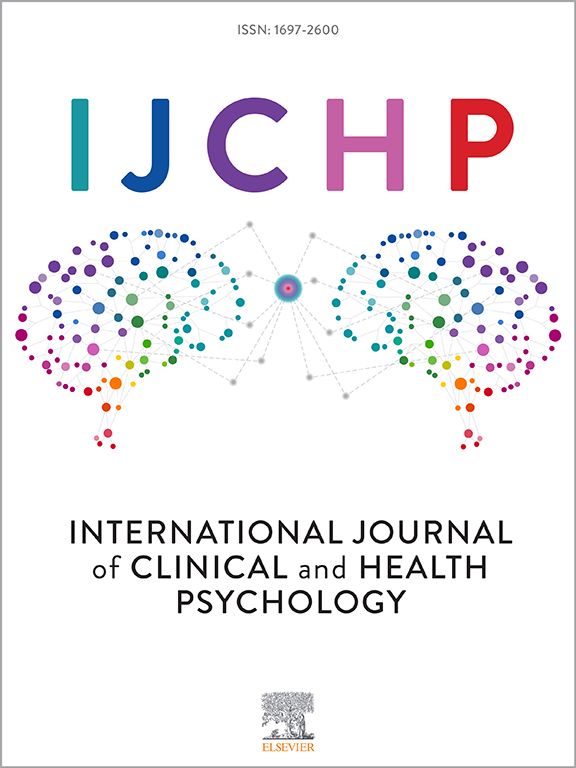Amplitude modulated gamma oscillations as electrophysiological markers for repetitive transcranial magnetic stimulation efficacy in treatment-resistant depression: a randomized sham-controlled study
IF 4.4
1区 心理学
Q1 PSYCHOLOGY, CLINICAL
International Journal of Clinical and Health Psychology
Pub Date : 2025-06-16
DOI:10.1016/j.ijchp.2025.100593
引用次数: 0
Abstract
Background
Gamma oscillations play an important role in cognitive processes, including emotional processing in humans. Abnormal gamma oscillations may reflect certain psychiatric disorders, such as major depressive disorder (MDD). However, less attention has been paid to the role of gamma oscillations in treatment-resistant depression (TRD) and their association with the response to repetitive transcranial magnetic stimulation (rTMS).
Methods
A total of 61 TRD patients were recruited for a two-week rTMS treatment consisting of ten sessions. Clinical assessments and eyes-closed resting-state electroencephalogram (EEG) recordings were conducted before and after treatment. Participants were randomly assigned to one of three treatment groups: prolonged intermittent theta burst stimulation (piTBS), 10-Hz rTMS, or a Sham group. Adaptive nonlinear analysis using Holo–Hilbert spectral analysis (HHSA) was applied to extract nonlinear information from the EEG data.
Results
Gamma oscillations were found to be positively correlated with scores on the Hamilton Depression Rating Scale (HDRS-17). Additionally, changes in alpha-beta amplitude modulation (AM) modulated gamma oscillations were significantly larger in the Sham group compared to the two active stimulation groups. Furthermore, alpha-beta AM modulated gamma activity was significantly lower in responders compared to non-responders prior to rTMS treatment, irrespective of the specific rTMS protocol.
Conclusions
Gamma oscillations may serve as an electrophysiological marker for the severity of depression in TRD. Additionally, alpha-beta AM could represent a potential predictor of response to rTMS treatment, identifiable prior to the treatment.
Clinical trials registry number
UMIN000020892.
调幅伽马振荡作为反复经颅磁刺激治疗难治性抑郁症疗效的电生理标记:一项随机假对照研究
伽马振荡在认知过程中发挥重要作用,包括人类的情绪处理。异常的伽马振荡可能反映某些精神疾病,如重度抑郁症(MDD)。然而,伽马振荡在难治性抑郁症(TRD)中的作用及其与重复经颅磁刺激(rTMS)反应的关系却很少受到关注。方法共招募61例TRD患者进行为期两周的rTMS治疗,包括10个疗程。治疗前后分别进行临床评估和闭眼静息状态脑电图(EEG)记录。参与者被随机分配到三个治疗组中的一个:延长间歇性θ波爆发刺激(piTBS), 10赫兹rTMS,或假手术组。采用Holo-Hilbert谱分析(HHSA)自适应非线性分析方法从脑电数据中提取非线性信息。结果伽玛振荡与汉密尔顿抑郁评定量表(HDRS-17)得分呈正相关。此外,与两个主动刺激组相比,假手术组α - β调幅(AM)调制的伽马振荡的变化明显更大。此外,在rTMS治疗前,与无应答者相比,应答者的α - β AM调制的γ活性显着降低,与特定的rTMS方案无关。结论伽马振荡可作为TRD患者抑郁程度的电生理指标。此外,α - β AM可能代表对rTMS治疗反应的潜在预测因子,在治疗前可识别。临床试验注册编号为umin000020892。
本文章由计算机程序翻译,如有差异,请以英文原文为准。
求助全文
约1分钟内获得全文
求助全文
来源期刊

International Journal of Clinical and Health Psychology
PSYCHOLOGY, CLINICAL-
CiteScore
10.70
自引率
5.70%
发文量
38
审稿时长
33 days
期刊介绍:
The International Journal of Clinical and Health Psychology is dedicated to publishing manuscripts with a strong emphasis on both basic and applied research, encompassing experimental, clinical, and theoretical contributions that advance the fields of Clinical and Health Psychology. With a focus on four core domains—clinical psychology and psychotherapy, psychopathology, health psychology, and clinical neurosciences—the IJCHP seeks to provide a comprehensive platform for scholarly discourse and innovation. The journal accepts Original Articles (empirical studies) and Review Articles. Manuscripts submitted to IJCHP should be original and not previously published or under consideration elsewhere. All signing authors must unanimously agree on the submitted version of the manuscript. By submitting their work, authors agree to transfer their copyrights to the Journal for the duration of the editorial process.
 求助内容:
求助内容: 应助结果提醒方式:
应助结果提醒方式:


